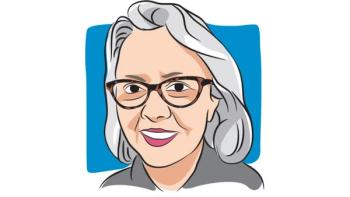
Opdivo-Yervoy Combination Induces Long-Term Survival in Metastatic Melanoma
One in two patients with metastatic melanoma is alive five years following treatment with Opdivo plus Yervoy, according to long-term follow-up of the phase 3 CheckMate 067 trial.
One in two patients with metastatic melanoma is alive five years following treatment with Opdivo (nivolumab) plus Yervoy (ipilimumab), according to long-term follow-up of the phase 3 CheckMate 067 trial presented at the European Society of Medical Oncology (ESMO) Congress 2019 in Barcelona, Spain.
“In the past, metastatic melanoma was regarded as untreatable,” study author Dr. James Larkin of the Royal Marsden NHS Foundation Trust in London, said in a press release issued by ESMO. “Oncologists considered melanoma different to other cancers — it couldn’t be treated once it had spread. Traditional chemotherapy never really worked well. This treatment transforms the disease to one with an approximately 50% cure rate. The priority now is to find ways to cure the remaining 50%.”
The five-year analysis of the trial is the longest phase 3 follow-up for a checkpoint inhibitor combination therapy.
In the trial, the researchers evaluated the combination in 945 patients with previously untreated stage 3 or 4 melanoma. Patients received either Opdivo plus Yervoy, Opdivo plus placebo or Yervoy plus placebo until progression or unacceptable toxicity.
The proportion of patients alive and free from subsequent therapy was 45% with Yervoy, 58% with Opdivo and 74% with combination therapy.
“We know that the two immunotherapy drugs together can have significant side effects and some patients even need to discontinue treatment. But for those patients who did stop treatment because of side effects, it did not impair the success of the therapy. In other words, the outcome for people who stop treatment because of side effects seems to be just as good as for people who didn’t stop treatment for side-effects,” Larkin said, adding that the benefit to immunotherapy is that the immune system can be re-educated.
“One of the key points about immunotherapies is that you can re-educate the immune system even with a short duration of treatment. This is in contrast to other treatments like chemotherapy which require a full course to be effective,” he said.
In addition, the combination showed a five-year overall survival rate of 52%, compared with 44% for Opdivo, and 26% for Yervoy. “This is a major improvement on what we have seen historically,” said Larkin. “Ten years ago, the five-year survival for melanoma was around 5%. With ipilimumab monotherapy, which has been used for around ten years, around 20% of patients are long-term survivors and the remainder live for just six to nine months.”
Lastly, the median time from treatment randomization to subsequent therapy was eight months with Yervoy alone, 25.2 months with Opdivo monotherapy, and is unreached with the combination immunotherapy.
Dr Teresa Amaral from the Centre for Dermato-oncology at Eberhard Karls University Tuebingen in Germany, commented on the study, saying further evaluation is needed. ““Further research is needed to identify the patients who are resistant to immunotherapy and will not derive any benefit. This is important not only because of the toxicity related to the therapy but also for the most effective use of resources.”




